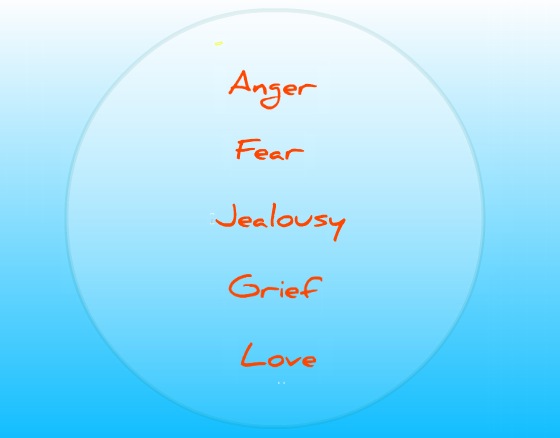 Let’s talk about emotions.
Let’s talk about emotions.
Emotions are feelings. They’re natural. They’re our response to being alive. Because we’re human – alive and awake – we have emotions. We feel.
As kids, many of us learned to stop emoting. It seemed like the feeling always got in the way.
Either we were taught to hide our feelings, or we just learned to do so – but either way, many of us internalized the idea that we oughtn’t have emotions.
The only problem with that way of living is that feeling is human. To be human IS to feel. To be happy, sad, angry, upset, and to feel life as it happens to us – is to experience what we’re here for.
(In fact, brain chemistry reveals that a diminution of all feelings is one aspect of depression.)
Emotions are how we relate to one another, how we react to the world. It is the birthright of every human being to have full emotions, and to be able to express them in a healthy manner.
While most of us can easily name the five senses, many of us get stuck on naming the 5 basic emotions. And precious few of us ever learned the purpose behind these basic emotions, the natural ways of expressing them, and how they commonly get distorted.
(By the way, most of my thoughts in this article are inspired by the work of Elisabeth Kubler-Ross, a psychiatrist, and Jacob Watson, whose audio about natural and distorted emotions is responsible for much of my learning.)
Each of the 5 basic emotions has a purpose. And each one can be expressed naturally, or it can be distorted. Before we examine each one, let me point out that we need to be compassionate towards ourselves when we realize we’re not expressing our emotions “naturally.” We’re all doing the best we can. As children, we often had no choice except to do what we could.
Here are the emotions:
- Grief
- Anger
- Jealousy
- Love
- Fear
Grief
Grief – The purpose of grief is to deal with our loss. How do we do it? We share our tears and stories until we feel heard. There are many distortions of grief, but the chief of them is blaming. Blaming others, blaming God, blaming oneself, having guilt and shame.
Anger
Anger – The purpose of anger is to change, to deal with disappointment. To assert ourselves, to say “no” when we need to. Think about a 2-year-old who has a temper tantrum and moves on – their outburst is intended to protest against what they find to be objectionable in the world, and then the anger is gone. Contrast this with us as adults who hold onto our anger. To have a leg-kicking, screaming fit is a natural expression of anger.
Most of us wind up holding onto anger, getting stuck with it. As a result, it comes out distorted in the form of bitterness, rage, or hate.
Jealosy
Jealousy – The purpose of jealousy is to compare ourselves with others. It helps us to learn.. We see someone with something and we think, I want that too. And, we learn that way. Children see adults (or other kids) doing things they wish yhey could do and it causes them to strive. Distortions of jealousy lead us to sabbotaging the person who has more than us to take someone away from them.
Fear
Fear – The purpose of fear is to protect ourselves. There are only two biologically natural, innate fears: (1) the fear of falling, and (2) the fear of loud noises. Every other “fear” we’ve learned. The good news is, we can unlearn it. (It often takes getting help and practicing.) The purpose of fear is to slow us down, to keep us cautious, to keep us safe. Fear leads to fight, freeze and flight – all of which are there to keep us safe. Some distortions of fear are phobias and anxiety.
Love
Love – The purpose of love is to express ourselves. A major distortion of love is prostituting ourselves – bartering our authentic self for love. It’s when we act in a certain way against how we wish to act, when we mask our desires or wants with the hopes of being seen. It’s conditional. Other distortions of love include possessiveness and clinging. But the natural emotion of love is to express ourselves as we really are.
With regard to these 5 emotions, our goal is to express them naturally and to be present when we feel them. (But let’s take it easy on ourselves if we’re not quite there yet.)
Spiritual-religious advice:
Welcome your emotions. They’re an important part of your unique human experience.
With love,
Rabbi Brian







